Tag Archive for: graduated income tax

Globe columnist Shirley Leung makes our argument on the tax hike amendment
In today's Boston Globe, business columnist Shirley Leung raises important questions about who exactly will be impacted by the tax hike amendment that will appear on the Massachusetts ballot in November. The answer is retirees and small business owners - and we have the data to prove it.

Survey of Business Sentiment: MA Income Tax Hike Would Lead to Employer Exodus
Nearly three quarters (73 percent) of Massachusetts business leaders think business associates will leave the state if a constitutional amendment appearing on the November ballot to hike taxes is successful, according to a survey conducted by Pioneer Institute.
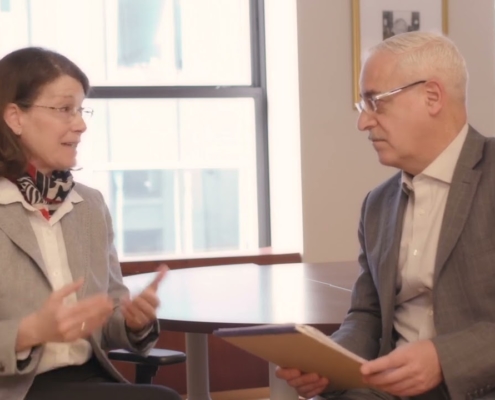
Hubwonk360 Video: If we tax them, will they leave?
In this brief, six-minute video, Pioneer Institute Executive Director Jim Stergios and Director of Government Transparency, Mary Z. Connaughton, walk through an amendment to the Massachusetts constitution that could dramatically increase the income tax on retirees and small businesses.
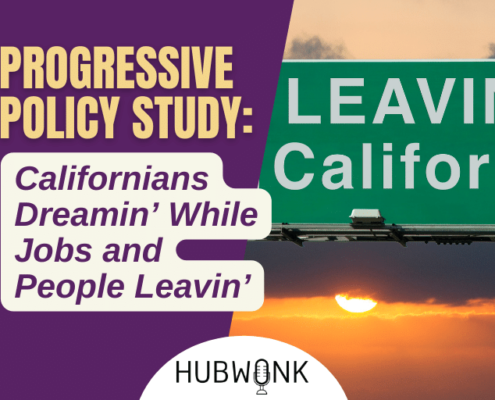
Progressive Policy Study: Californians Dreamin’ While Jobs and People Leavin’
Hubwonk host Joe Selvaggi talks with California Policy Center president Will Swaim about how the state’s ambitious policies have combined to stick its residents with the highest cost of living and a tax regime that discourages investment, innovation, and its vital entrepreneurial class.

Why the Legislature would likely use the proposed tax amendment as a blank check
This report shows that the plaintiffs in Anderson v. Healey have good reason to demand a more accurate description of the graduated income tax amendment. Experience from other states and the actions of the Massachusetts Legislature demonstrate that voters should be given a more realistic picture of how the revenue is likely to be spent before going to the polls in November.

Study: Legislature Likely to Reduce Spending on Education and Transportation from Other Revenue Sources, Replace Cuts with Surtax Money
Revenue from a ballot initiative to amend the state Constitution and raise income taxes on households and businesses by adopting a graduated income tax structure would supposedly provide resources for transportation and public education, but a new study published by Pioneer Institute finds that, were the tax amendment to pass, the money would be fungible and much of it likely spent on general budget measures.

Fair Share Flimflam: Misleading Ballot Summary Could Distort Voter Choice
Joe Selvaggi talks with Attorney Kevin Martin, appellate litigator at Goodwin Proctor, about the complaint filed with the Massachusetts Supreme Judicial Court regarding the summary language on the 2022 "Fair Share Tax” ballot initiative. Kevin explains how the language misleads the public about the impact of their vote on revenue, spending, and our state’s constitution.

Pioneer Supports Legal Challenge to Misleading Tax Ballot Language, Releases Video
Pioneer Institute supports the diverse and bipartisan group that filed a complaint with the Massachusetts Supreme Judicial Court (SJC) challenging the summary language meant to provide an accurate description of the tax hike amendment to voters. The language was approved by the Attorney General and Secretary of the Commonwealth when a similar amendment was proposed in 2018, and unless the lawsuit is successful, will likely appear on the Massachusetts ballot in November.
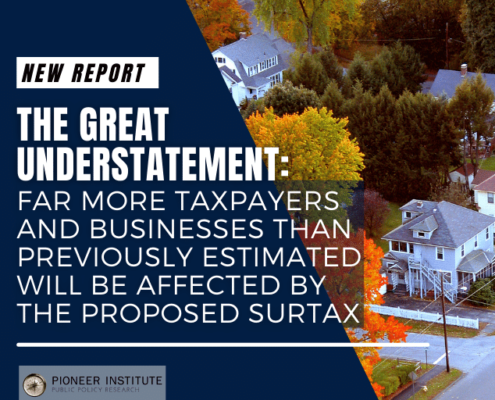
The Great Understatement: Far more taxpayers and businesses than previously estimated will be affected by the proposed surtax
This report finds that analyses from the Massachusetts Department of Revenue (MADOR, 2016) (and more recently, Tufts University’s Center for State Policy Analysis (2022)) dramatically underestimated the number of households and businesses impacted by the constitutionally-imposed tax hike that the legislature is putting before voters in November 2022. The proposed tax would impact multiples of the number of people previously estimated, over a nine-year period, since the majority of “millionaires” only earn $1 million once during that time.

Study: Tax Up For A Vote In November Would Ensnare Over Three Times More Taxpayers Than Previously Estimated
Analyses from the Massachusetts Department of Revenue (MADOR, 2016) and Tufts University’s Center for State Policy Analysis (2022) dramatically underestimated the number of households and businesses impacted by the constitutionally-imposed tax hike that the legislature is putting before voters in November 2022, according to a new study from Pioneer Institute.
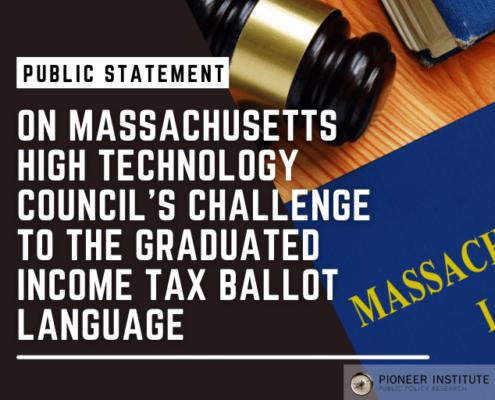
Public Statement on Massachusetts High Technology Council’s Challenge to the Graduated Income Tax Ballot Language
The Massachusetts High Technology Council is right to insist on transparency in the language of a tax hike amendment scheduled to appear on the Massachusetts state ballot next year.

Study: “Millionaire’s Tax” Would Have Far-Reaching Effects on “Pass-Through” Businesses
A proposed graduated income tax that will appear on the statewide ballot in November 2022 will have much more far-reaching implications than most people realize because the surtax also extends to “pass-through” income from entities such as S and limited liability corporations, partnerships, and sole proprietorships that are taxed on individual tax returns, according to a new study published by Pioneer Institute.

The Far-Reaching Impact of a Massachusetts Surtax: Anecdotal Evidence and Data Analysis
This report shows that a proposed graduated income tax that will appear on the statewide ballot in November 2022 will have much more far-reaching implications than most people realize because the surtax also extends to “pass-through” income from entities such as S and limited liability corporations, partnerships, and sole proprietorships that are taxed on individual tax returns.

A Timely Tax Cut: How New Hampshire is Taking Advantage of Massachusetts’ Graduated Income Tax Proposal
As Massachusetts voters weigh an amendment to the state constitution to enact a surtax on million-dollar earners, they should be cognizant of how the policies of other states could interact with the tax hike to encourage an exodus of jobs and capital, especially in proximate jurisdictions. New Hampshire is a neighboring state that has already benefited from out-migration from Massachusetts to the tune of over $426 million in taxable income in 2019 alone. A new budget amendment there, passed in July 2021, will eliminate the interest and dividends tax by 2027, contributing to a divergence in tax policy that might attract an increasingly mobile workforce and entrepreneurial base.

Study Warns that New Hampshire Tax Policies Would Exacerbate Impacts of a Graduated Income Tax
Drawing on migration patterns between Massachusetts and states like Rhode Island and Tennessee, Pioneer Institute is releasing a study showing a direct correlation between personal income tax rates and household domestic migration patterns between 2004 and 2019. The study suggests that instituting a graduated income tax will shrink the tax base and deter talented workers and innovative employers from coming to and staying in the Bay State.

Study Finds SALT Deduction Cap, Graduated Income Tax Will Combine to More Than Double Tax Burden on Some Households
A provision of the federal Tax Cuts and Jobs Act of 2017 strictly limiting deductions for state and local taxes (SALT) will greatly exacerbate the adverse effects of a proposal to create a constitutionally mandated graduated income tax, according to a new study published by Pioneer Institute.

Study Says Massachusetts Surtax Proposal Could Reduce Taxable Income in the State by Over $2 Billion
As voters now begin to weigh the potential impact of a ballot proposal to increase taxes on business owners, retirees and wealthier households, a new literature review by Pioneer Institute shows that many existing academic studies find that wealthy individuals are particularly sensitive to changes in tax policy. Other studies explicitly warn policymakers that behavioral responses to taxing the rich could erode the tax base and ultimately strain state budgets.

Tax Flight of the Wealthy: An Academic Literature Review
A new literature review by Pioneer Institute shows that many existing academic studies find that wealthy individuals are particularly sensitive to changes in tax policy. Other studies explicitly warn policymakers that behavioral responses to taxing the rich could erode the tax base and ultimately strain state budgets. The Pioneer Institute study ties the results of these academic pieces into Massachusetts’ current graduated income tax proposal.
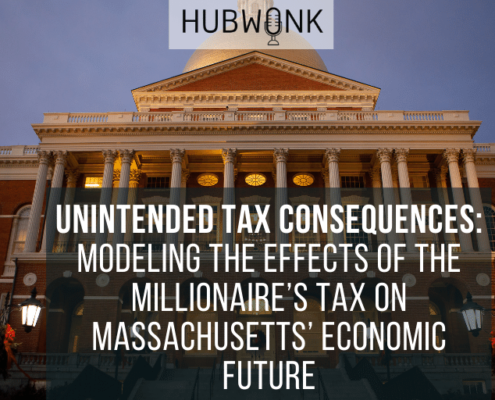
Unintended Tax Consequences: Modeling the Effects of the Millionaire’s Tax on Massachusetts’ Economic Future
0 Comments
/
Hubwonk host Joe Selvaggi talks with Beacon Hill Institute President Dr. David Tuerck about his recent analysis of the proposed 4% surtax on incomes over $1 million in Massachusetts, and his estimate of the number of individuals who will leave the state as a result. Tuerck, an economist, used STAMP modeling tools comparing the static projections offered by proponents of the so-called "Fair Share Amendment" with a model simulation that accounts for the unintended effects of the tax.

This Is No Time for a Tax Increase
This is no time to threaten Massachusetts’ prospects for an immediate economic recovery and the long-term competitiveness of the Commonwealth’s businesses. As Massachusetts lawmakers prepare to vote on whether to send a proposed constitutional amendment that would impose a 4 percent surtax on residents who earn $1 million or more in a year to the statewide ballot in 2022, Pioneer Institute urges them to recognize that tax policy sizably impacts business and job location decisions and that jobs are more mobile than ever.

Are Massachusetts taxes regressive? A common argument for a graduated income tax relies on a deeply flawed and outdated study
Advocates of the proposed surtax paint a picture of the Massachusetts tax system as highly regressive. They fail to mention that ITEP, the organization that produced the data upon which they rely, rated Massachusetts as having a more progressive tax system than 29 other states. ITEP fails to adequately explain their model’s treatment of the tax incidence of sales, excise, and property taxes, and they exclude a number of other aspects of the tax code that make it seem artificially regressive.

Study Finds Deep Flaws in Advocates’ Claims that the Massachusetts Tax Code is Regressive
Proponents of a state constitutional amendment to add a 4 percent surtax on all households with annual income above $1 million frequently cite 2015 data from the Institute on Taxation and Economic Policy, which argues that the Massachusetts tax code is regressive, but a new study published by Pioneer Institute debunks many of the underlying assumptions used in ITEP’s 2015 report.
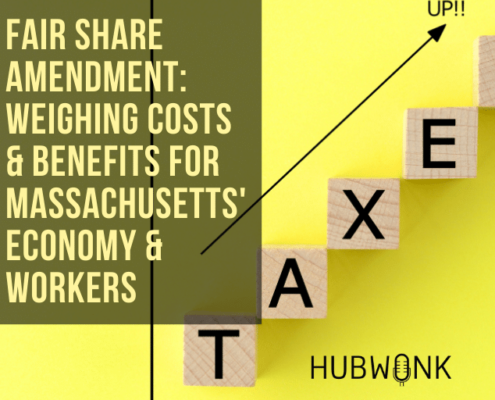
Fair Share Amendment: Weighing Costs & Benefits for Massachusetts’ Economy & Workers
Hubwonk host Joe Selvaggi talks with Pioneer Institute’s Executive Director Jim Stergios about HB86, the so-called Fair Share Amendment, to tax Massachusetts household income above $1 million. They discuss its promises, its costs, and the effects of similar legislation in other states.
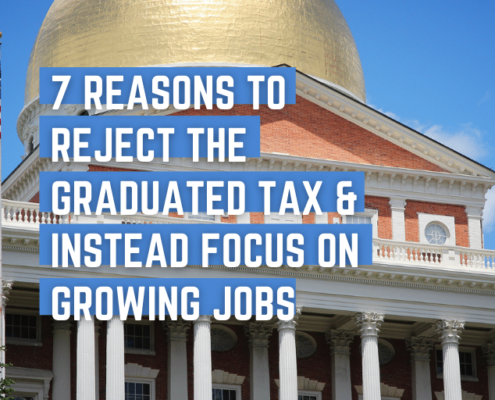
7 Reasons to Reject the Graduated Tax and Instead Focus on Growing Jobs
Pioneer Institute's Statement before the Joint Committee on Revenue In Opposition to: HB 86 (Pages 1-4), a legislative amendment to the Constitution to provide resources for education and transportation through an additional tax on incomes in excess of one million dollars.

Study Shows the Adverse Effects of Graduated Income Tax Proposal on Small Businesses
The state constitutional amendment promoted by the Massachusetts Teachers Association and the Service Employees International Union to add a 4 percent surtax to all annual income above $1 million will adversely impact a significant number of pass-through businesses, ultimately slowing the Commonwealth’s economic recovery from COVID-19, according to a new study published by Pioneer Institute.

The Graduated Income Tax Trap: A Tax on Small Businesses
This policy brief finds that the state constitutional amendment promoted by the Massachusetts Teachers Association and the Service Employees International Union to add a 4 percent surtax to all annual income above $1 million will adversely impact a significant number of pass-through businesses, ultimately slowing the Commonwealth’s economic recovery from COVID-19.

Study: Graduated Income Tax Proposal Fails to Protect Taxpayers from Bracket Creep
The state constitutional amendment proposed by the Service Employees International Union and the Massachusetts Teachers Association to add a 4 percent surtax to all annual income above $1 million purports to use cost-of-living-based bracket adjustments as a safeguard that will ensure only millionaires will pay. But historic income growth trends suggest that bracket creep will cause many non-millionaires to be subject to the surtax over time, according to a new study published by Pioneer Institute.

The Great Mismatch: The graduated income tax proposal’s gravely flawed escalation factor
The state constitutional amendment proposed by the Service Employees International Union and the Massachusetts Teachers Association to add a 4 percent surtax to all annual income above $1 million purports to use cost-of-living-based bracket adjustments as a safeguard that will ensure only millionaires will pay. But historic income growth trends suggest that bracket creep will cause many non-millionaires to be subject to the surtax over time, according to this report, "The Great Mismatch: The graduated income tax proposal’s gravely flawed escalation factor."

New Study Warns Graduated Income Tax Will Harm Many Massachusetts Retirees
If passed, a constitutional amendment to impose a graduated income tax would raid the retirement plans of Massachusetts residents by pushing their owners into higher tax brackets on the sales of homes and businesses, according to a new study published by Pioneer Institute. The study, entitled “The Graduated Income Tax Trap: A retirement tax on small business owners,” aims to help the public fully understand the impact of the proposed new tax.

The Graduated Income Tax Trap: A retirement tax on small business owners
This report finds that, if passed, a constitutional amendment to impose a graduated income tax would raid the retirement plans of Massachusetts residents by pushing their owners into higher tax brackets on the sales of homes and businesses. The study aims to help the public fully understand the impact of the proposed new tax.
